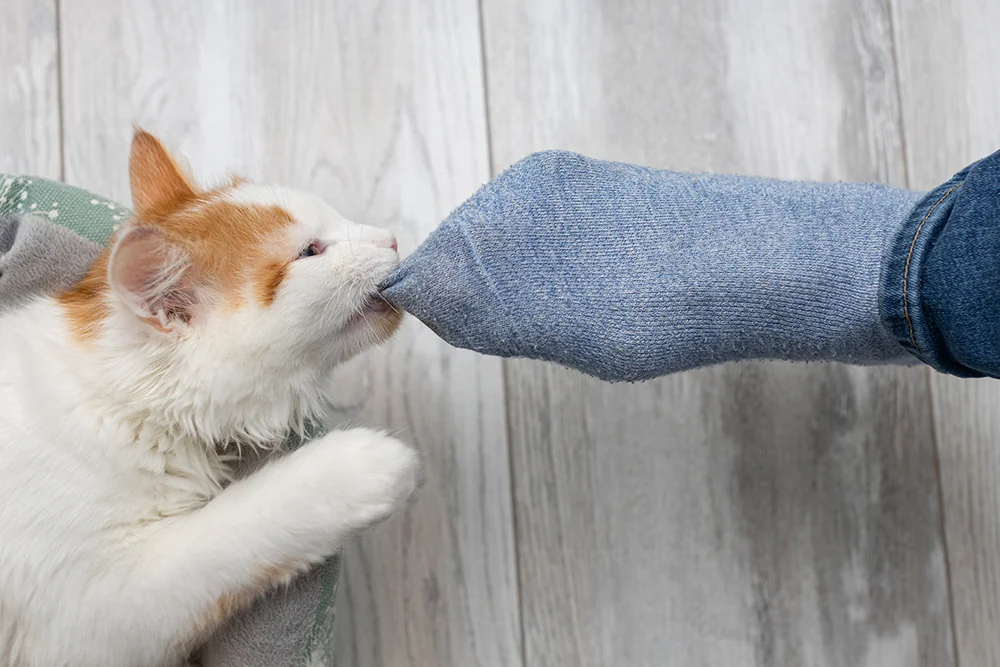Have you ever been rudely awakened by your cat biting at your feet? Or perhaps you’ve been going about your daily activities when suddenly, out of the blue, your feline friend launches an attack on your toes. While it might seem amusing at first, constant biting can become an annoyance. At Bayshore Veterinary Hospital, we often get questions from concerned pet parents about why their cat is displaying this behavior.

Understanding Cat Behavior: Biting and Nipping
Cats are creatures of instinct, and their behaviors often have roots in their wild ancestry. Biting is a normal part of feline behavior, but when your cat bites at your feet, it’s important to understand what they’re trying to communicate.
The Playful Predator – Cats and Play-Biting
Cats are natural predators. They’re wired to chase, pounce, and bite. When your cat attacks your feet, they might just be treating them like a moving target, exercising their predatory instincts in a playful manner. Kittens often engage in this type of behavior as a form of play and learning.
Communication Breakdown – Understanding Feline Signals
Another reason your cat might be biting your feet is to communicate something. It could be a sign of frustration or a plea for attention. Cats may also bite if they’re feeling threatened or anxious. It’s crucial to pay attention to the context in which the biting occurs to better understand your cat’s needs.
Common Reasons Why Cats Bite Feet
Several reasons may contribute to your cat’s foot-biting habit. These could include:
- Play and exercise: Cats often use biting as a form of play. Your moving feet might trigger your cat’s chase instinct.
- Overstimulation: Some cats can become overexcited or overstimulated, leading to biting. This could happen during playtime or when they receive too much petting.
- Communication: Your cat may be trying to tell you something. This could be a need for attention or a way to express discomfort.
- Fear or anxiety: If your cat feels threatened, they might respond by biting. This could be due to a change in the environment or an unfamiliar person or pet.
How to Discourage Your Cat from Biting Your Feet
Biting is a natural cat behavior, but it’s not something you want to encourage, especially when it’s directed at your feet. Here are some tips to discourage this behavior:
Distract, Divert, Discourage – Training Tips for Cats
- Redirect the behavior: Use toys to divert your cat’s attention. Interactive toys can help channel their energy away from your feet.
- Positive reinforcement: Reward your cat when they play without biting. This could be with a treat or extra petting.
- Say no: Use a firm “No” when your cat starts to bite. It’s important to consistently discourage this behavior.
When to Seek Professional Help for Your Cat’s Behavior
Sometimes, despite our best efforts, we need professional help to address our pets’ problematic behaviors. If your cat’s biting becomes excessive, causes harm, or is accompanied by other worrisome behaviors, it’s time to consult with a professional.
Holmdel’s Trusted Veterinary Care – Bayshore Veterinary Hospital
At Bayshore Veterinary Hospital, our team of experts in Holmdel, NJ, is ready to help you better understand your cat’s behavior and provide the necessary guidance. With our experience and compassionate approach, we can help ensure your cat’s health and happiness.
Don’t hesitate to give us a call at (732) 671-3110 or visit our website at https://bayshore-vet.com/ to make an appointment. Together, we can work on strengthening the bond between you and your feline friend, ensuring a harmonious and loving relationship for years to come.
